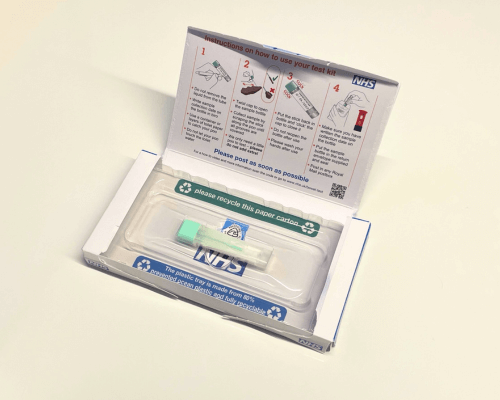New research shows who is less likely to complete a poo test after visiting their GP
Thursday 9 October 2025
The study from Newcastle University, funded by our pilot grant programme, found that men, young people and people living in more deprived or more ethnically diverse areas are less likely to complete a poo test when asked by their GP.
What is a poo test?
When people go to their GP with symptoms of possible bowel cancer – such as a change in their pooing habits or a pain in their tummy — the GP will usually ask them to complete a faecal immunochemical test, or FIT.
This is a small plastic kit used to collect a sample of poo, which is then tested for traces of blood. Based on the results, the GP will decide what needs to happen next, such as referring the patient for a colonoscopy.
Patients complete the poo test at home in their own time and return it for analysis. However, some people don’t send their test back – even though they’ve taken the step of telling their GP that they’ve noticed something is wrong.
This slows down the next steps of any further tests or referral. While most people who go to their GP with bowel symptoms won’t have bowel cancer, some of them will. If their diagnosis is delayed, it gives more time for their cancer to advance, which can make it harder to treat.
What were the researchers looking at?
The group at Newcastle University, led by Dr Christina Dobson, analysed patient data to look for patterns in who does and doesn't return the poo test after visiting their GP.
“We wanted to understand what proportion of people complete their tests, and whether there are certain types of patients who may be more, or less, likely to return their test. By understanding this we can begin to think about which patients may need extra support to complete the test,” says Dr Dobson.
They looked at all requests for one year at a testing centre in Gateshead which covers the North and North East of England – data from almost 126,000 patients.
What did they find?
More than 9 in 10 people did return their poo test, which is very encouraging. And of those people, more than half returned it within one week.
But certain groups were significantly less likely to complete the poo test, including:
- Men
- People under the age of 50
- People living in more deprived areas
- People living in more ethnically diverse areas
- People living in more urban areas
Dr Dobson says, “Although it's encouraging many people do return their tests, it's concerning that a minority choose not to. We know this can have impact on how quickly a patient can be diagnosed and treated. Some of the patients least likely to return a test are already groups in whom we know that the cancer risk may be higher, or who may be less likely to survive their cancer."
What happens next?
These results have been published in the British Journal of General Practice, sharing the findings with the wider scientific and clinical community.
Now that more is known about which groups of people are more in need of support to do their poo test, Dr Dobson and her team are moving on to think about ways to do this.
“It’s crucial that we do work to understand the challenges that these patients face and develop ways to support them to complete their test, return it quickly, and ensure that bowel cancers are diagnosed as early as possible,” says Dr Dobson.
They’ll be talking to patients, healthcare professionals and community organisations about what might be stopping people from doing their test, such as difficulty using the kit, embarrassment about collecting a poo sample, or not understanding its importance.
They'll work with these groups on ideas for practical ways to ensure everyone completes their poo test when asked by their GP.
We're also funding this next phase of the research. Read more about the follow-up project.
- Read more about the at-home poo test
- Find out more about talking to your GP about bowel cancer symptoms
- Learn about our current research projects

Above: A faecal immunochemical test (FIT) as offered in England.
FIT tests appearances vary between nations.
